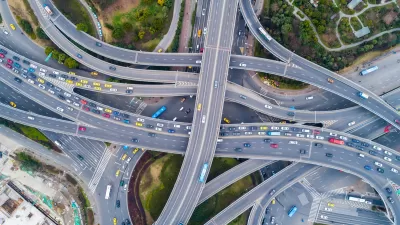Transportation planners and public officials have begun to consider ways to reconfigure cities and alter driving patterns in order to reduce vehicle miles traveled and reduce greenhouse gas emissions.
"A furious, though still fledgling, effort has commenced to help America's drivers curtail their trips, burn less fuel and, ultimately, emit less CO2. It involves a marriage of transportation planning, land use planning, engineering and public policy to implement everything from smart growth to congestion pricing to increased use of mass transit. And if that wasn't complicated enough, it will involve every level of government, from town hall to the United Nations."
"Transportation planners used to strive for less congestion or faster flows, but overall traffic volume was a fact of life. Now the focus is shifting into reverse. '[Transportation planning] has to be very important [in reducing CO2],' former Clinton administration Energy Secretary Bill Richardson told InTransition. 'You can't have a planet without energy-efficient transportation systems that emphasize commuter rail, light rail, open space and land use policies that protect quality of life.'"
"At more intimate scales, local land use and transportation planning may take a page from urban planning, in which efforts to promote infill, mixed-use, TOD and walkable, bikeable development have long been underway. It is hoped this sort of development would compel residents to walk rather than drive and focus their attention on their immediate communities, whose charms will make freeway trips and gridlock less appealing."
FULL STORY: Transportation Planning Warms Up To Climate Change

Planetizen Federal Action Tracker
A weekly monitor of how Trump’s orders and actions are impacting planners and planning in America.

Restaurant Patios Were a Pandemic Win — Why Were They so Hard to Keep?
Social distancing requirements and changes in travel patterns prompted cities to pilot new uses for street and sidewalk space. Then it got complicated.

Map: Where Senate Republicans Want to Sell Your Public Lands
For public land advocates, the Senate Republicans’ proposal to sell millions of acres of public land in the West is “the biggest fight of their careers.”

Maui's Vacation Rental Debate Turns Ugly
Verbal attacks, misinformation campaigns and fistfights plague a high-stakes debate to convert thousands of vacation rentals into long-term housing.

San Francisco Suspends Traffic Calming Amidst Record Deaths
Citing “a challenging fiscal landscape,” the city will cease the program on the heels of 42 traffic deaths, including 24 pedestrians.

California Homeless Arrests, Citations Spike After Ruling
An investigation reveals that anti-homeless actions increased up to 500% after Grants Pass v. Johnson — even in cities claiming no policy change.
Urban Design for Planners 1: Software Tools
This six-course series explores essential urban design concepts using open source software and equips planners with the tools they need to participate fully in the urban design process.
Planning for Universal Design
Learn the tools for implementing Universal Design in planning regulations.
Heyer Gruel & Associates PA
JM Goldson LLC
Custer County Colorado
City of Camden Redevelopment Agency
City of Astoria
Transportation Research & Education Center (TREC) at Portland State University
Camden Redevelopment Agency
City of Claremont
Municipality of Princeton (NJ)




























